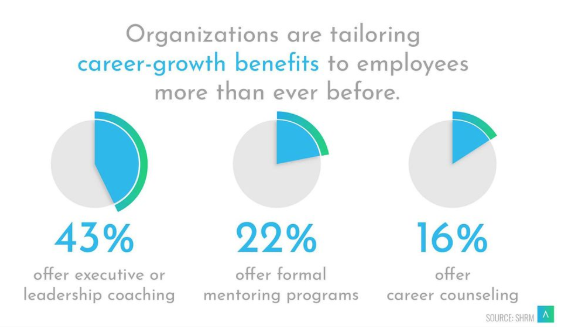Today, we find ourselves living in a hyper-connected economy that changes rapidly. What does this mean? It means that employees have to become more adaptable and widen their skill set when necessary. One way employees can accomplish this is by continuing their education, whether at the certification or MBA level, full-time or part-time. With 87% of millennials saying that professional development is important in a job, companies and organizations should do their best to provide all with continuing education opportunities.

Photo Credit: Forbes
Benefits for All
Employers can offer continuing education opportunities in a variety of ways. The most common opportunities have come in the form of corporate universities, local university education, certifications, and tuition reimbursement. All of these options are great for the employee and company alike according to Jefferson Flanders, President, and CEO of MindEdge. He told Inc.:
“It’s vital that employees continue to learn, and certainly for those under age 40 with the number of employers and potentially the number of different industries they will work in, the ability to adapt and learn is one of the most important factors in long-term career success.”
Employees won’t stay in one position for the entirety of their career; they will look to move up in a company or transfer to a different one. Having the opportunity to continue education gives employees flexibility and ultimately a more comprehensive skill set.
If your company wants to achieve long-term viability and profitability, add a continuing education program. Educated employees who are well-trained and have a broad skill set to help companies to thrive and grow. Workers who can continue learning while retaining their jobs foster engagement within the company and it opens doors to leadership positions.
Take Action Now
All companies should start making continuing education and employee training a high priority. They can do this by fostering a work environment where learning is welcome. Meet the needs of your employees and company by sending out a quick survey to learn what’s necessary for professional success. This is a great way to get a pulse on what type of continuing education program to implement.
When starting out, programs don’t have to be elaborate. By simply offering employees resources on how to develop professionally, companies can lay the groundwork for a larger continuing education program in the future. For example, if everyone in the office wants more training on writing, offer writing workshops with management. You can set this up for other skill sets as well.
Education is something we should all run with the best we can if given the opportunity. Companies that offer continuing education programs see an uptick in employee engagement and profitability. Employees who take advantage of learning a new skill set become more adaptable and ready to tackle anything that comes their way.

